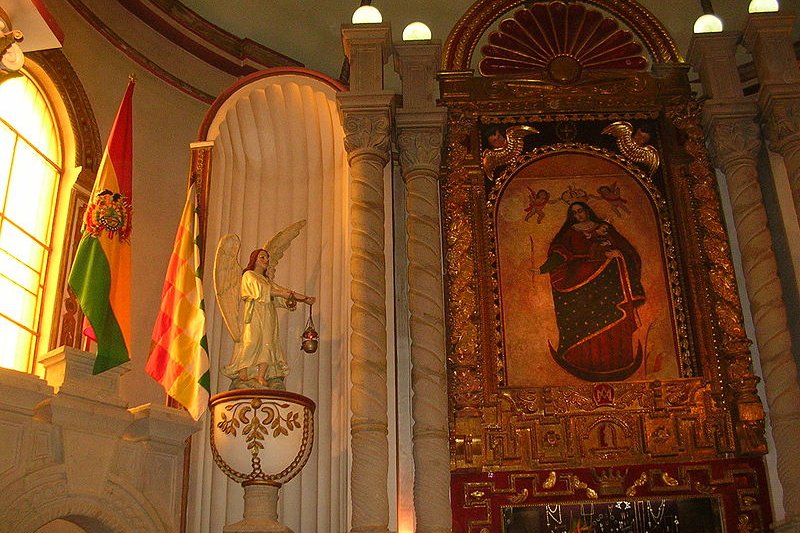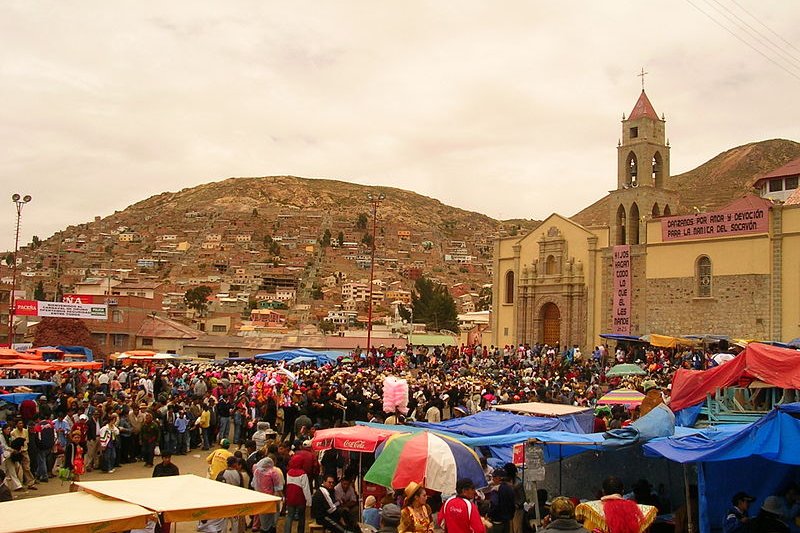
 Santuario de la Virgen del Socavón, Oruro, Bolivia
Santuario de la Virgen del Socavón, Oruro, BoliviaSource: https://commons.wikimedia.org/wiki/File:Santuario_de_la_Virgen_del_Socav%C3%B3n.JPG
Author: José Porras/Elemaki

Oruro is a city in the central western part of Bolivia. The city with a population of 235,000 (2011 estimate) is located about half way between La Paz and Sucre. The city is at an elevation of 3,706 m (12,159 ft).
Oruro is located north of the salt lakes of Uru-Uru and Poopó, in a arid part of Central America. The city is renowned for its extremely cold winters. The warmest months in Oruro are from August to October, before the summer rain arrives. Despite being surrounded by an arid region, Oruro does receive quite a lot of rain from November to March. The coldest months are from May to July, when night time temperature can drop to -20°C.
Oruro was established in 1606 for the purpose of mining silver. It was originally named Real Villa de San Felipe de Austria, in honor of King Philip III of Spain. The town went into decline once the silver ore was exhausted, but received a second lease on life in the late 19th century, when rich deposits of tin was discovered there. For a while Oruro was the richest tin mine in the world. Eventually the tin too was exhausted, and Oruro receded into a second slumber.
 The Santuario de la Virgen del Socavón, Oruro, during the Carnival
The Santuario de la Virgen del Socavón, Oruro, during the CarnivalSource: https://commons.wikimedia.org/wiki/File:Carnavales_Oruro_dia_II_%2868%29.JPG
Author: José Porras/Elemaki

Today Oruro is developing into a popular tourist destination in Bolivia. The town becomes quite crowded during the Carnaval de Oruro, a folk religious celebration that has been recognized by UNESCO as an intangible heritage of humanity. The festival drawns prehispanic elements into a Christian celebration. There would be processions and folk dances.
Visiting Oruro
You can reach Oruro by bus from La Paz. The journey takes 3-4 hours. There are also bus services linking it with Cochabamba, which is up to five hours away.Sights & Attractions in Oruro
- Museo Etnográfico Minero
Located in an actual mine tunnel, this museum offers a glimpse into Bolivian mining. - Museo Mineralógico
Museum displaying samples of rocks, minerals and fossils. - Museo Nacional Antropológico Eduardo Lóplez Rivas
Anthropological museum that provides information about the local Chipayas and Urus tribes as well as the Carnaval de Oruro. - Museo Patiño
Museum located within the home of the late tin baron Simón Iturri Patiño.
 Latest updates on Penang Travel Tips
Latest updates on Penang Travel Tips
About this website

Dear visitor, thank you so much for reading this page. My name is Timothy Tye and my hobby is to find out about places, write about them and share the information with you on this website. I have been writing this site since 5 January 2003. Originally (from 2003 until 2009, the site was called AsiaExplorers. I changed the name to Penang Travel Tips in 2009, even though I describe more than just Penang but everywhere I go (I often need to tell people that "Penang Travel Tips" is not just information about Penang, but information written in Penang), especially places in Malaysia and Singapore, and in all the years since 2003, I have described over 20,000 places.
While I try my best to provide you information as accurate as I can get it to be, I do apologize for any errors and for outdated information which I am unaware. Nevertheless, I hope that what I have described here will be useful to you.
To get to know me better, do follow me on Facebook!
Copyright © 2003-2025 Timothy Tye. All Rights Reserved.

 Go Back
Go Back